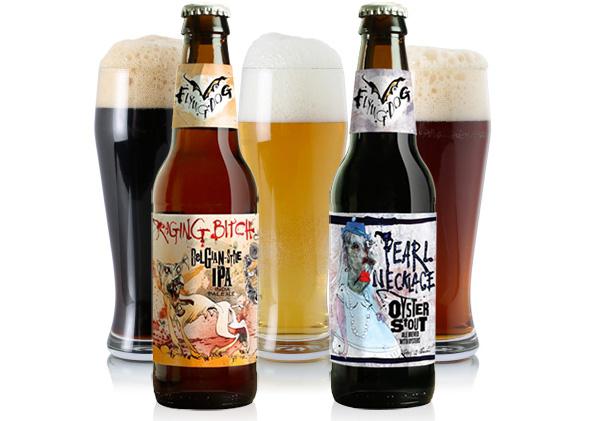1978 was the worst year for beer diversity in post-Prohibition America, with only 89 breweries operating in the entire country. Most of those breweries sucked, so a nation addled by other drugs might not have realized that things were starting to look up. President Carter decriminalized home-brewing that year, empowering a generation of garage-based drinkers and dreamers to develop their own recipes and techniques. A lot of these hobbyists eventually went pro, leading to the well-chronicled rise of craft beer.
Now the U.S. is home to more than 3,500 breweries, half of which have opened since 2010. There are currently thousands of companies making beer that’s better than pretty much anything that was available up through the mid-1990s. The new-wave brewers have distinguished themselves from their predecessors by employing better ingredients in innovative ways. But there’s one area in which they’re stuck in 1978: A lot of craft beer marketing is astonishingly sexist.
Only the very largest craft beer companies can afford traditional mass-media advertising—craft breweries are far more likely to sponsor charity 5Ks than NASCAR races. But just because they don’t have the means to subject television viewers to images of bikini-clad women clamoring for a Budweiser-wielding bull terrier’s affection doesn’t mean they can’t be even more offensive in their own little ways.
The first marketing decision any business faces is a product’s very name, and this is where too many craft brewers embarrass themselves and alienate potential customers.
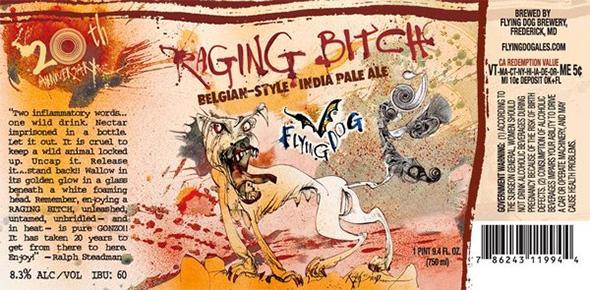
Via beerpulse.com
One of the higher-profile repeat offenders is Flying Dog Brewery of Frederick, Maryland, maker of many dog- and dog-plus-one-more-entendre-themed beers including Raging Bitch Belgian-Style IPA and Pearl Necklace Oyster Stout. Both have ready-made plausible deniability baked into their origin stories. Raging Bitch is art, because Hunter S. Thompson sidekick Ralph Steadman designed the label; plus, duh, a bitch is a female dog!
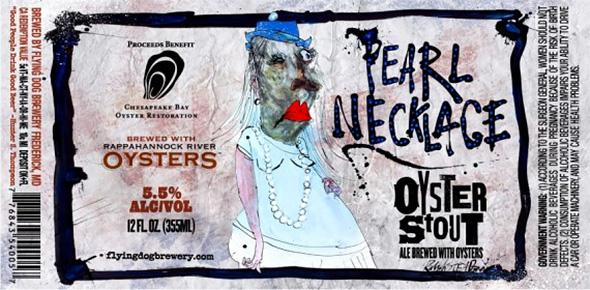
Via thefullpint.com
Pearl Necklace’s label shows a dog wearing a necklace made out of pearls, which are found in oysters, which are used to make oyster stout. Alas, “pearl necklace” also refers to a porny sex act and, even worse, a ZZ Top song commemorating said act.
Atlanta’s SweetWater Brewing Co. gained notoriety in March when a Chicago outpost of Binny’s Beverage Depot refused to stock their Happy Ending imperial stout. The store’s former beer manager, Adam Vavrick, told the Chicago Tribune, “This label is about a female Asian sex worker manually stimulating a man to orgasm and cleaning up the ejaculate with tissues. Why is that appropriate on a beer label?”* Since subtlety is not always the beer marketer’s strong suit, review samples of this year’s Happy Ending were sent out to beer writers with mini bottles of skin cream.
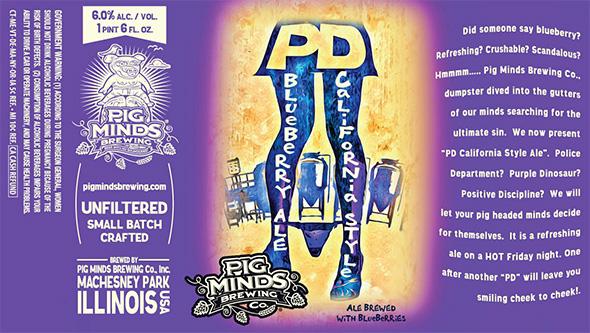
Via illmakeitmyself.net
At least it can be argued that erotic masseuses and women who are turned on by ZZ Top are displaying some degree of sexual agency. It’s hard to make that case for the wobbly legged drunk lady with her underwear around her ankles depicted on the label of Pig Minds Brewing’s PD California Ale. The label says “Pig Minds Brewing Co. dumpster dived into the gutters of our mind searching for the ultimate sin” before suggesting that perhaps PD refers to “purple dinosaur,” “police department,” or “positive discipline.” Or, you know, panty dropper, something that encourages—or coerces—a woman to have sex. Something like, for instance, a blueberry beer made by a company that calls a variant of its Irish red ale “Vanilla Bitch.”
The problem isn’t that these labels hint at sex. It’s that they and others of their ilk almost never refer to mutually respectful sex. It’s ironic that the one beer name Flying Dog has seen fit to retire is Doggy Style Pale Ale, which is a cheesy thing to call a beer, but at least the act referenced isn’t inherently degrading to, or unpleasurable for, women. Sex and sexism aren’t the same thing, which is why there’s nothing wrong with Sierra Nevada calling its new pilsner Nooner. Go ahead and evoke consensual, mutually beneficial daytime screwin’ all you like. But the vast majority of beer-land sex references objectify women, or worse.
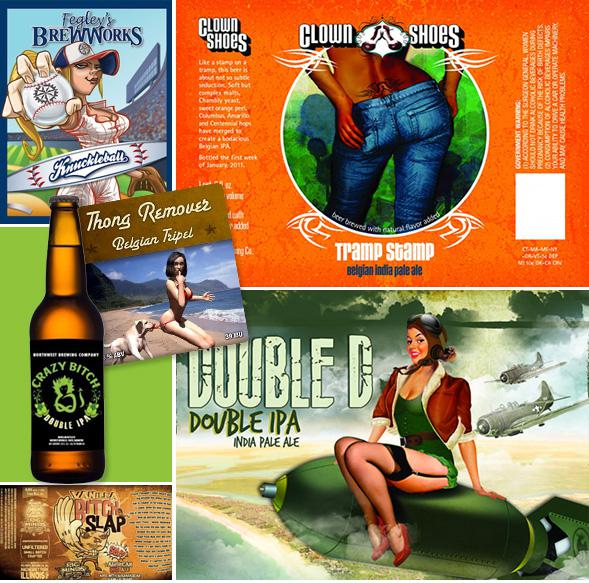
Via thebrewworks.com, clownshoesbeer.com, eyeonannapolis.net, artmeetslabel.com, marinamarket.com, and ratebeer.com
Does the beer industry’s sexism problem run deeper than a very large handful of labels? I went looking for some smoking guns—maybe a lecherous brewer who insisted sales reps get breast implants so they could look like the lady on the label—but conversations with more than a dozen women in the beer game suggested the misogyny is rarely that overt. Every woman I talked to cited the offensive names and labels, and several mentioned the recent skeeviness of a trade conference event at a Madison, Wisconsin, strip club (for which the slogan was, “Grab hold of a pair”), but none implied that the gender problems in brewing were Dov Charney–level blatant.
Bay Area writer and bartender Jen Muehlbauer, who has addressed the issue several times on her blog, summed up the consensus opinion: “I can cite examples of sexism both extreme and subtle in the beer industry, but so can any woman in any industry. I don’t think beer in particular has a woman problem so much as planet earth does.”
And the way that planet Earth’s sexism affects the craft beer world may not be excusable, but it is understandable. A lot of the off-putting labeling is due to breweries’ painful obsession with puns. When a male-dominated industry relies on a middle school rhetorical device to name beers, it’s going to come up with a lot of jokes about body parts or bodily functions, and boobs sell better than farts. And the beer industry has had to come up with tens of thousands of new product names in a short period of time. The tech world might be just as bad given the opportunity: Google only had to resist making the middle of its logo a pair of breasts once; breweries have to fight their puerile demons on a regular basis.
But the casual sexism on display on many beer labels is all the more jarring considering the progressive image cultivated by many craft beer advocates. Civic-mindedness and inclusivity play a big part in the rhetoric of new-beer evangelists. It’s not unusual for craft breweries to sponsor park cleanups, local preservation efforts, and the aforementioned charity 5Ks. This is all well and good, but it’s not very compatible with sexist beer marketing. A nascent industry heavily reliant on reputation can’t expect half of its potential customer base to overlook rampant objectification on account of the occasional public act of decency.
Even if brewers don’t care about doing the right thing, they ought to retire sexist beer labels for the sake of profit. Women drink nearly 32 percent of all craft beer sold in America. Why name your beer something that at least a third of your potential customers might feel uncomfortable ordering? Jenny Pfäfflin, an exam manager for Cicerone.org, estimates that roughly 22 percent of certified cicerones (beer sommeliers, more or less) are women, and she expects that percentage to rise. These are women who recommend beer for a living. Maybe don’t go out of your way to piss them off?
*Correction, July 6, 2015: This article originally misstated that Adam Vavrick is still the beer manager at Binny’s Beverage Depot. This article also contained an incorrect image of SweetWater’s Happy Ending label.
